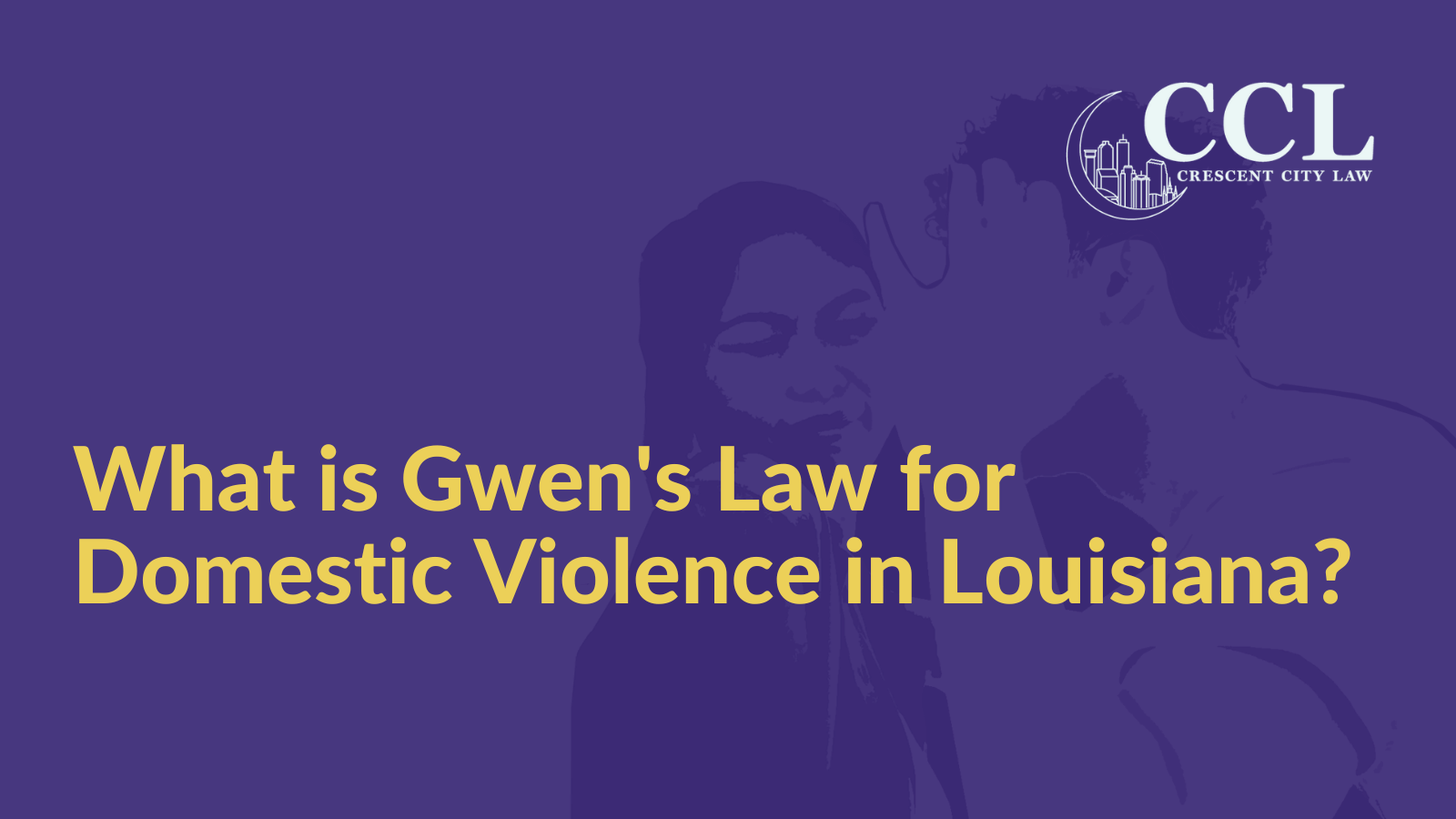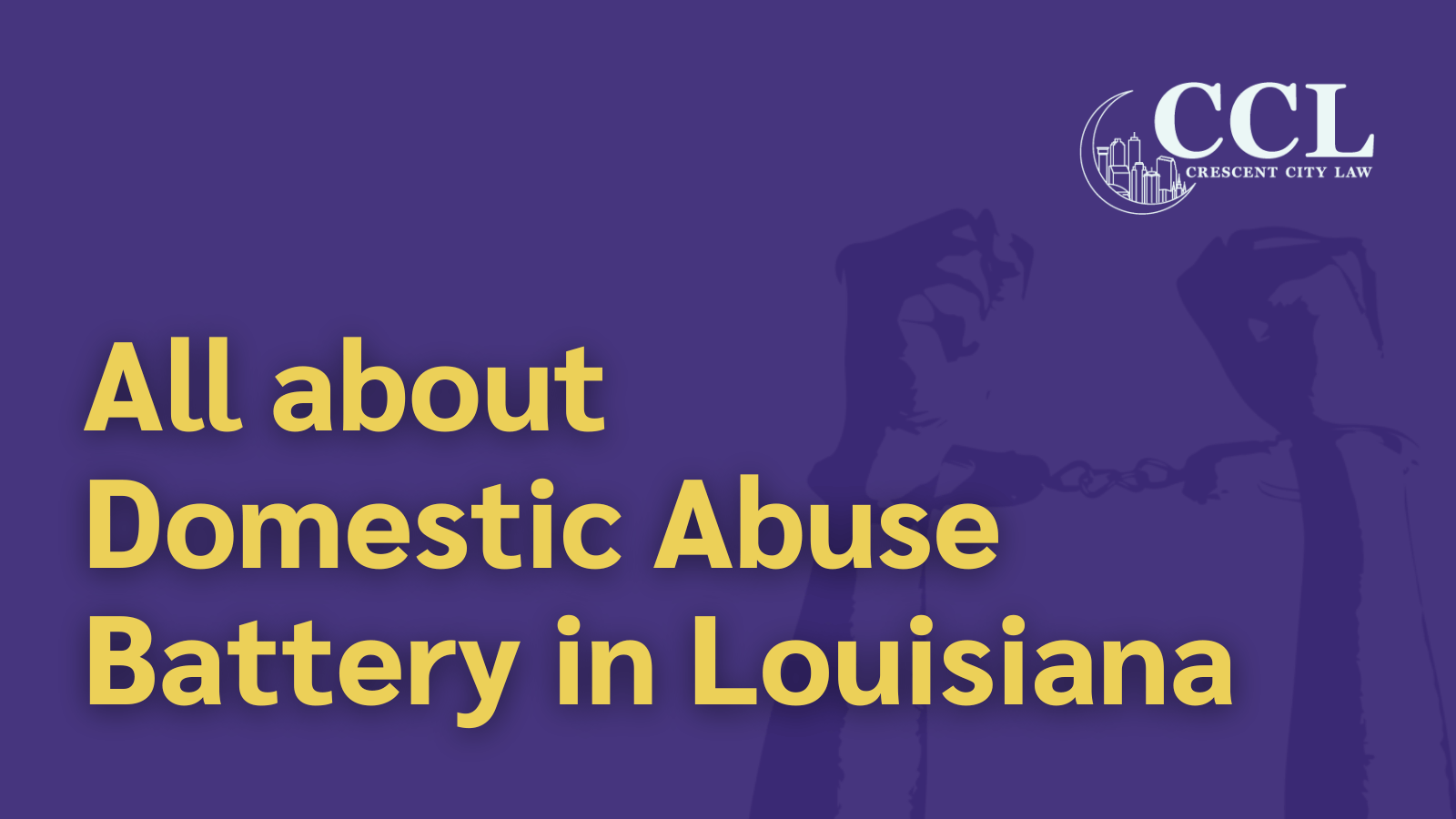Have you or someone you know recently faced allegations of domestic violence or domestic abuse battery?
In Louisiana, the terms “domestic abuse battery” and “domestic violence” are often used interchangeably, but they have distinct legal meanings.
In this blog post, our Louisiana-based domestic violence attorney at Crescent City Law aims to provide you with a comprehensive understanding of the difference between domestic abuse battery and domestic violence, its associated penalties, and how it is addressed within the legal framework of Louisiana.
What Is Domestic Violence in Louisiana?
Domestic violence encompasses a broader range of behaviors beyond physical harm. In Louisiana, domestic violence happens when someone in a household hurts or controls another person who lives there. It can happen between spouses, partners who are dating, or even roommates.
But it’s not just physical harm; victims also face other kinds of abuse, such as:
- Psychological Abuse. This happens when someone says or does things intentionally to hurt someone emotionally. It might include things like making threats, stalking, or making the victim feel worthless or crazy.
- Sexual Abuse. This means forcing someone to do sexual actions without their consent. It could be rape, touching without permission, or sharing private pictures or videos without approval.
- Financial Abuse. This is when one person controls all the money and resources in the household without letting the other person have any say. Abusers often use this to make the victim feel trapped and dependent on them.
Domestic violence encompasses a broader scope of abusive behaviors that may occur within domestic relationships in Louisiana.
Our criminal defense lawyer at Crescent City Law has spent years providing support to clients accused of domestic violence, guiding them through the legal process with compassion.
What is Domestic Abuse Battery in Louisiana?
Domestic abuse battery, as defined by Louisiana Law RS 14:35.3, occurs when one person deliberately employs violence, coercion, or force against a household member without their consent. It involves acts like hitting, punching, slapping, or any form of physical aggression within the household context.
If the victim isn’t a member of the perpetrator’s household, it’s classified differently under the law.
Domestic violence encompasses a broader scope of abusive behaviors that may occur within domestic relationships in Louisiana.
Our criminal defense lawyer at Crescent City Law has spent years providing support to clients accused of domestic violence, guiding them through the legal process with compassion.
Domestic Abuse Battery Penalties in New Orleans
Domestic abuse battery carries significant penalties and sentences in New Orleans, varying based on the number of offenses committed.
- First offense: Considered a misdemeanor with fines up to $1,000 and six months in jail, including a mandatory 48-hour incarceration without probation or parole.
- Second offense: Considered a misdemeanor with fines up to $1,000 and a jail term of 60 days to one year, including a mandatory 14-day incarceration without probation or parole.
- Third offense: Felony with a minimum fine of $5,000 and imprisonment ranging from 10 to 30 years, with at least three years to be served without probation or parole.
- Fourth and subsequent offenses: Felony with a minimum fine of $5,000 and imprisonment of 10 to 30 years, including a mandatory three-year incarceration without probation or parole.
It’s crucial to recognize that a conviction for domestic abuse battery can have enduring consequences.
Seeking legal representation is essential to navigate the complexities of the court system and understand potential outcomes tailored to one’s individual circumstances.
Can You Drop Domestic Abuse Battery Charges in New Orleans?
If you find yourself facing charges of domestic abuse battery in New Orleans, it’s crucial to take immediate action to protect your rights. A skilled domestic violence attorney can answer your questions and offer guidance and advocacy to mitigate the impact of these charges.
Understanding the distinction between criminal cases and civil lawsuits is key to addressing whether domestic abuse battery charges can be dropped.
Criminal cases initiated by the state or prosecution aim to prosecute offenders and secure penalties such as incarceration. On the other hand, civil cases seek justice and compensation for victims of wrongful or violent acts, including domestic violence.
Victims have the autonomy to pursue a civil lawsuit to obtain restitution for damages like personal injury and medical expenses.
In such civil proceedings, victims retain control and can choose to “drop charges.” However, in criminal cases, victims typically have minimal influence over case progression and may only participate by providing testimony if required.
It’s important to note though, that in criminal cases, it’s the prosecution’s decision whether to drop charges, which is why it’s important to work with a criminal defense lawyer to work toward the best outcome for your case.
Contact Crescent City Law Domestic Abuse Battery Lawyer Today
At Crescent City Law, we firmly believe that everyone deserves a shot at redemption. Accusations of domestic violence can lead to the court imposing a protective order against you, and this can have a profound impact on every aspect of your life.
At Crescent City Law, we have a wealth of experience defending clients in domestic abuse battery cases. We understand that every situation is unique, and we are committed to providing personalized and strategic defense tailored to your specific circumstances.
Don’t face these charges alone—let us advocate for you and work tirelessly to protect your rights and achieve the best possible outcome.
Contact us today at 504-264-9492 to schedule a free consultation and take the first step toward resolving your case.






